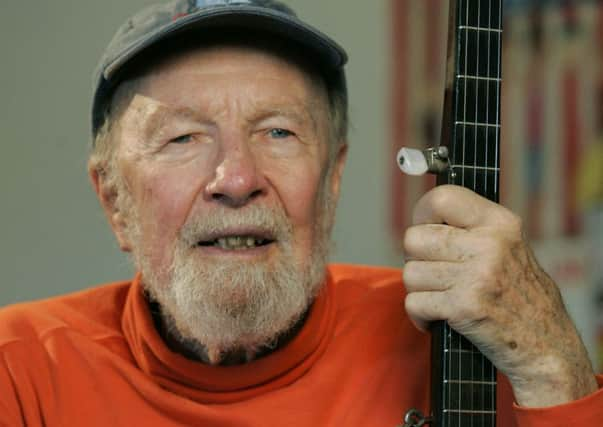Protesters’ champion leaves legacy of activist melodies


Seeger’s grandson, Kitama Cahill-Jackson, said his grandfather died peacefully in his sleep at about 9.30pm on Monday in the New York Presbyterian Hospital, where he had been for six days. Family members were with him.
“He was chopping wood 10 days ago,” Mr Cahill-Jackson recalled.
Advertisement
Hide AdAdvertisement
Hide AdSeeger – with his a lanky frame, banjo and full white beard – was a well-known figure in folk music. He performed with Woody Guthrie in his younger days and marched with Occupy Wall Street protesters in his 90s, leaning on two canes.
He wrote or co-wrote If I Had A Hammer, Turn, Turn, Turn, Where Have All The Flowers Gone and Kisses Sweeter Than Wine. He lent his voice against Hitler and nuclear power. A cheerful warrior, he typically delivered his broadsides with an affable air and his banjo strapped on.
“Be wary of great leaders,” he told reporters two days after a 2011 Manhattan Occupy march. “Hope that there are many, many small leaders.”
With The Weavers, a quartet put together in 1948, Seeger helped set the stage for a national folk revival. The group – Seeger, Lee Hays, Ronnie Gilbert and Fred Hellerman – churned out hit recordings of Goodnight Irene, Tzena, Tzena and On Top Of Old Smokey.
Advertisement
Hide AdAdvertisement
Hide AdSeeger also was credited with popularising We Shall Overcome, which he printed in his publication People’s Song in 1948. He later said his only contribution to the anthem of the civil rights movement was changing the second word from “will” to “shall”, which he said “opens up the mouth better”.
“Every kid who ever sat around a campfire singing an old song is indebted in some way to Pete Seeger,” Arlo Guthrie once said.
Seeger’s musical career was always tightly linked with his political activism, in which he advocated for causes ranging from civil rights to the clean-up of his beloved Hudson River. Seeger said he left the Communist Party in about 1950 and later renounced it. But the association dogged him for years. He was kept off commercial television for more than a decade after tangling with the House Un-American Activities Committee in 1955.